Report on Aspects of Emotional Intelligence
Added on 2020-05-04
22 Pages4369 Words50 Views
Running head: EMOTIONAL INTELLIGENCE
Emotional Intelligence
Name of the Student:
Name of the University:
Author note:
Emotional Intelligence
Name of the Student:
Name of the University:
Author note:

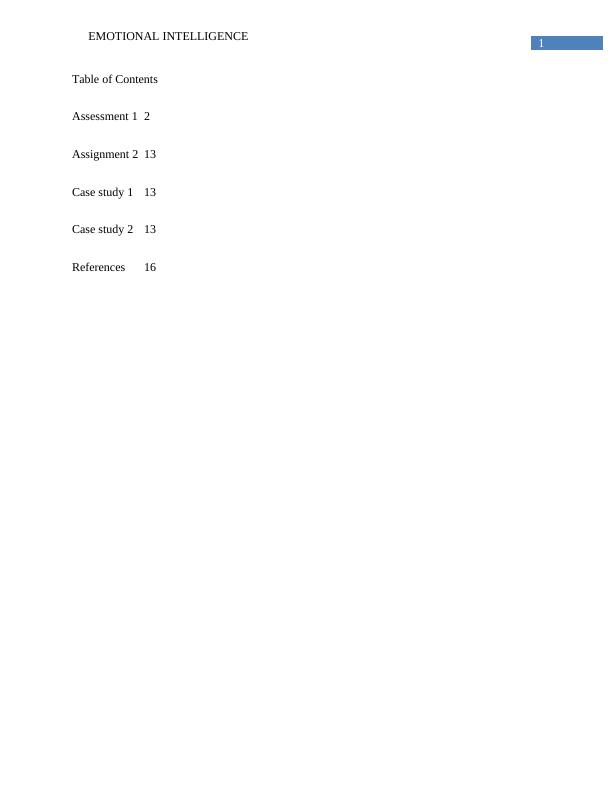
2
EMOTIONAL INTELLIGENCE
Assessment 1
Answer to Question1
The four aspects of emotional intelligence are self-awareness, self-management, social
awareness and relationship management.
Self awareness- It refers to how an individual assess himself or herself. It is the ability of
every individual to assess themselves and see that how they respond to the various
situations.
Self management- It refers to the ability of individuals to manage their emotions and have
control over them. This aspect focuses on individual transparency, adaptability,
achievement and optimism.
Social Awareness- It refers to the level of awareness people have regarding the society. It
focuses on individual awareness of their organizations.
Relationship management- This refers to the ability to manage relationships with others.
It focuses on how individuals contribute towards developing others (Dwyer & Hopwood,
2013).
Answer to question2
Emotion- Emotions are discrete and short-lived feelings, like happiness, disappointment,
fear, optimism and insecurity. Emotions are derived from the circumstances that human
beings face.
Mood- Mood is also temporary but they last longer than emotions. Examples of mood
are, negative mood, cheerful mood, feeling down and positive mood. Individual’s mood
depends on their emotional state (Dwyer & Hopwood, 2013).
EMOTIONAL INTELLIGENCE
Assessment 1
Answer to Question1
The four aspects of emotional intelligence are self-awareness, self-management, social
awareness and relationship management.
Self awareness- It refers to how an individual assess himself or herself. It is the ability of
every individual to assess themselves and see that how they respond to the various
situations.
Self management- It refers to the ability of individuals to manage their emotions and have
control over them. This aspect focuses on individual transparency, adaptability,
achievement and optimism.
Social Awareness- It refers to the level of awareness people have regarding the society. It
focuses on individual awareness of their organizations.
Relationship management- This refers to the ability to manage relationships with others.
It focuses on how individuals contribute towards developing others (Dwyer & Hopwood,
2013).
Answer to question2
Emotion- Emotions are discrete and short-lived feelings, like happiness, disappointment,
fear, optimism and insecurity. Emotions are derived from the circumstances that human
beings face.
Mood- Mood is also temporary but they last longer than emotions. Examples of mood
are, negative mood, cheerful mood, feeling down and positive mood. Individual’s mood
depends on their emotional state (Dwyer & Hopwood, 2013).
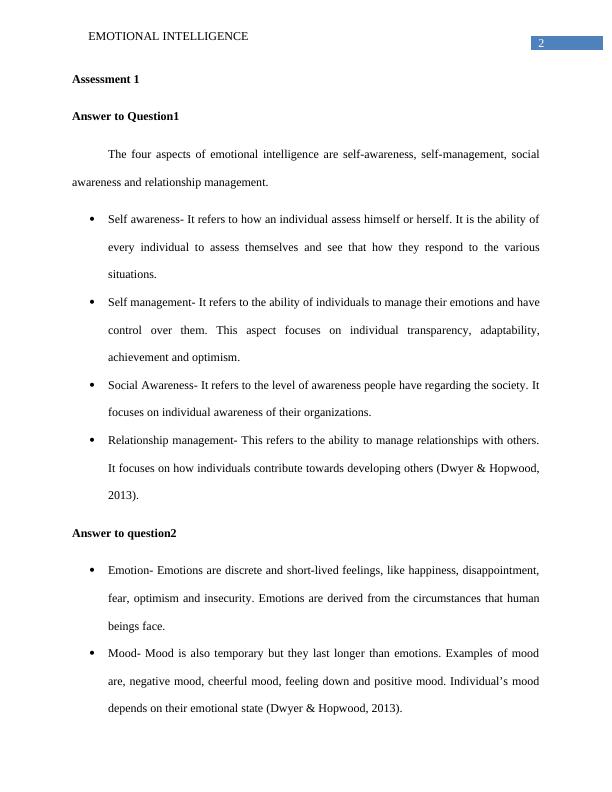
3
EMOTIONAL INTELLIGENCE
Personality traits- It can be defined the characteristics of individuals that help them to
approach life in a unique way. The most popular personality traits are the big five
personality traits,
Answer to Question 3a.
Factors that impact team’s mood
Level of trust- The level of trust team members have on each other influences the mood
of the team
Appreciations- If team members are appreciated they are generally in happy mood and if
not they will be sad and gloomy.
Safety- If the team members feel safe in their workplace they will be in a positive mood
but if they do not feel safe then they will be in fear and insecurity (Dwyer & Hopwood,
2013).
EMOTIONAL INTELLIGENCE
Personality traits- It can be defined the characteristics of individuals that help them to
approach life in a unique way. The most popular personality traits are the big five
personality traits,
Answer to Question 3a.
Factors that impact team’s mood
Level of trust- The level of trust team members have on each other influences the mood
of the team
Appreciations- If team members are appreciated they are generally in happy mood and if
not they will be sad and gloomy.
Safety- If the team members feel safe in their workplace they will be in a positive mood
but if they do not feel safe then they will be in fear and insecurity (Dwyer & Hopwood,
2013).
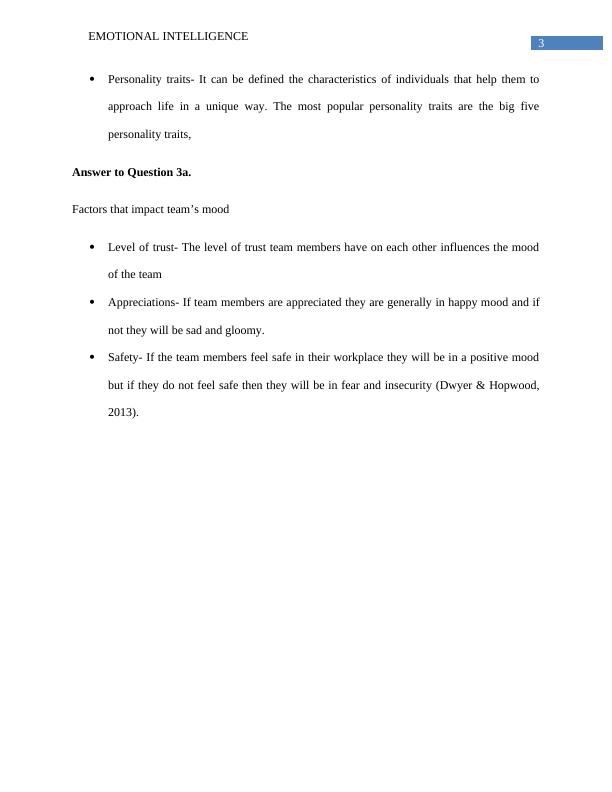
4
EMOTIONAL INTELLIGENCE
Answer to Question 3b.
Mood contagion- It is situation that occurs when an individual is influenced by the mood of
another person and matches with him or her. In an organization employees matches the mood of
their managers.
Answer To Question3c
Attitudes- Attitudes can be defined as the feelings, intentions and beliefs of any person
towards other person, situation or a thing (Menegazzo et al., 2015).
Answer to Question 4a.
Two Motivating feelings identified
Happiness- Happy employees are always motivated
Enthusiasm- If the employees are enthusiastic they will be motivated towards their work.
Answer to Quetion4b
Two de motivating feelings identified
Dissatisfaction- If the employees are not feeling satisfied with their job, position or work
environment then there are chances that employees would be de motivated.
Insecurity- If the employees feel insecure about their jobs then they will be lowly
motivated (Dutton, Workman & Hardin, 2014).
Answer to Question 5a.
Factors that prevent the expression of emotions at workplace are,
EMOTIONAL INTELLIGENCE
Answer to Question 3b.
Mood contagion- It is situation that occurs when an individual is influenced by the mood of
another person and matches with him or her. In an organization employees matches the mood of
their managers.
Answer To Question3c
Attitudes- Attitudes can be defined as the feelings, intentions and beliefs of any person
towards other person, situation or a thing (Menegazzo et al., 2015).
Answer to Question 4a.
Two Motivating feelings identified
Happiness- Happy employees are always motivated
Enthusiasm- If the employees are enthusiastic they will be motivated towards their work.
Answer to Quetion4b
Two de motivating feelings identified
Dissatisfaction- If the employees are not feeling satisfied with their job, position or work
environment then there are chances that employees would be de motivated.
Insecurity- If the employees feel insecure about their jobs then they will be lowly
motivated (Dutton, Workman & Hardin, 2014).
Answer to Question 5a.
Factors that prevent the expression of emotions at workplace are,
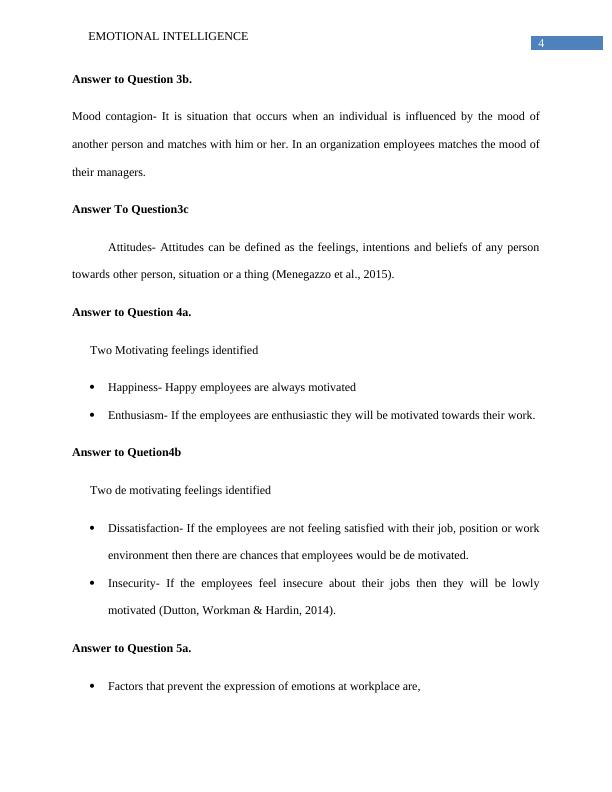
5
EMOTIONAL INTELLIGENCE
Work pressure
Emotional outburst can make an employee distracted and lose his concentration. As a
result of which his productive capacity might get hampered. So, it is very much essential for an
employee to manage his emotions very carefully. Even if he is emotionally low, he must keep a
smile on his face and maintain his professional appearance.
Fear of bullying
An employee must be very alert at his workplace regarding his emotions. Not every
employee at a workplace is of a good nature. There are people who can take the undue advantage
of an overemotional person and can also bully him. Hence, it is important for an employee to
manage his emotions very tactfully at his workplace.
Answer to Question5b
Constructive release of emotions helps in reduction of stress and makes the employees
motivated towards their work. It is very difficult to manage the both positive and negative
emotion. Emotions are required to be expressed but in a way that it is constructive. For example
when someone is angry if they show their anger on colleagues then it would not be good for
healthy interpersonal relationship. Instead of showing, anger and shouting so one can control
their anger and give a feedback. It will help in building good relationships with others and would
have also helped the other employee to improve their flaws (Humphrey, Ashforth & Diefendorff,
2015).
EMOTIONAL INTELLIGENCE
Work pressure
Emotional outburst can make an employee distracted and lose his concentration. As a
result of which his productive capacity might get hampered. So, it is very much essential for an
employee to manage his emotions very carefully. Even if he is emotionally low, he must keep a
smile on his face and maintain his professional appearance.
Fear of bullying
An employee must be very alert at his workplace regarding his emotions. Not every
employee at a workplace is of a good nature. There are people who can take the undue advantage
of an overemotional person and can also bully him. Hence, it is important for an employee to
manage his emotions very tactfully at his workplace.
Answer to Question5b
Constructive release of emotions helps in reduction of stress and makes the employees
motivated towards their work. It is very difficult to manage the both positive and negative
emotion. Emotions are required to be expressed but in a way that it is constructive. For example
when someone is angry if they show their anger on colleagues then it would not be good for
healthy interpersonal relationship. Instead of showing, anger and shouting so one can control
their anger and give a feedback. It will help in building good relationships with others and would
have also helped the other employee to improve their flaws (Humphrey, Ashforth & Diefendorff,
2015).
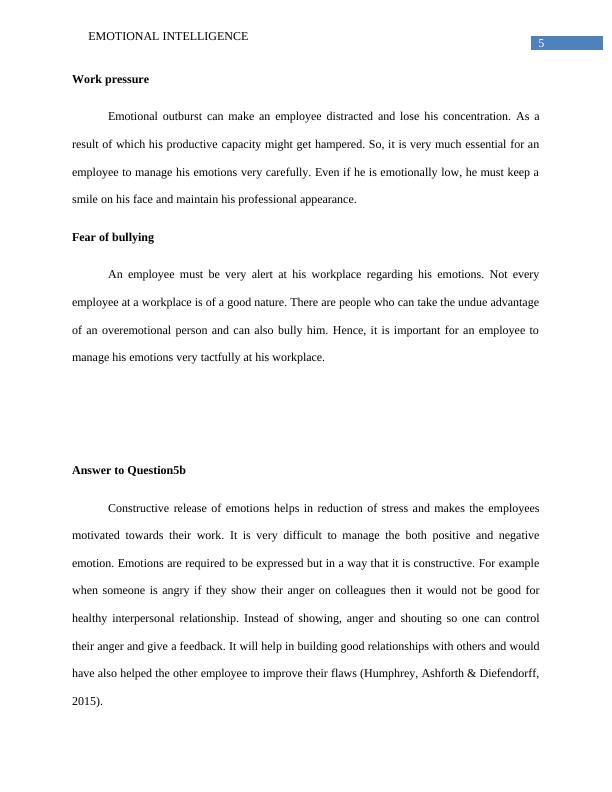
End of preview
Want to access all the pages? Upload your documents or become a member.
Related Documents
Emotional Intelligencelg...
|7
|1540
|274
Emotional Intelligencelg...
|8
|1750
|481
How Emotional Intelligence Helps in Improving Professional Relationship at Workplacelg...
|7
|1931
|22
Emotions of Managers Reportlg...
|6
|1120
|30
Designing a Professional Workshop on Emotional Intelligence for Team Leaders at Josephmarklg...
|9
|2412
|190
Collaboration in Classroom Management | Reportlg...
|5
|1056
|57
